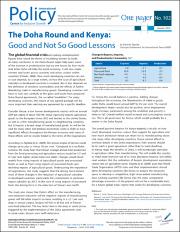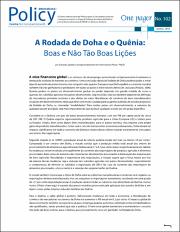Please use this identifier to cite or link to this item:
https://repositorio.ipea.gov.br/handle/11058/15788Files in This Item:
| File | Description | Size | Format | |
|---|---|---|---|---|
| en_IPCOnePager102.pdf | 58.95 kB | Adobe PDF |  View/Open | |
| pt-br_IPCOnePager102.pdf | 104.71 kB | Adobe PDF |  View/Open |
| Title: | The Doha Round and Kenya: Good and Not So Good Lessons |
| Other Titles: | A Rodada de Doha e o Quênia: Boas e Não Tão Boas Lições |
| Authors: | Zepeda, Eduardo |
| Abstract: | The global financial crisis and spiking unemployment figures have raised the threat of escalating barriers to trade. An early conclusion to the Doha Round might help avert some of the increase in protectionism, but no one knows by how much. And while Doha will help the world economy, it will also create winners and losers across countries and across sectors within countries (Polaski, 2006). How much developing countries can win or lose depends, to a large extent, on how the issue of agricultural subsidies in developed countries is resolved. But it also depends on the definition of sensitive commodities and the effects of further liberalising trade in manufacturing goods. Developing countries will have to look very carefully at the gains and losses from proposed Doha Round agreements, the so-called “modalities”. For many developing countries, the nature of any agreed package will be more important than reaching any agreement by a specific deadline. A crise financeira global e os números do desemprego aumentando vertiginosamente levantaram a |
| metadata.dc.rights.holder: | International Policy Centre for Inclusive Growth United Nations Development Programme |
| metadata.dc.rights.license: | O texto e dados desta publicação podem ser reproduzidos desde que as fontes sejam citadas. Reproduções com fins comerciais são proibidas. |
| metadata.dc.type: | One Pager |
| Appears in Collections: | Publicações do IPC-IG |
Items in DSpace are protected by copyright, with all rights reserved, unless otherwise indicated.

